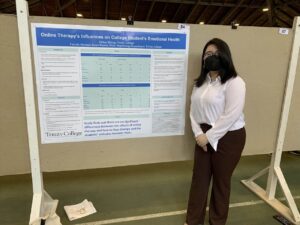Student Research Projects and Theses
Trinity undergraduates conduct research with faculty members in courses, course labs, independent studies, research assistantships, summer research, the Interdisciplinary Science Program (ISP — a First Year program), and senior theses. Research conducted during the school year is presented in the all-college research symposium poster session in early May. Summer research is presented in September.
Senior Thesis FAQ Handout
- What is a senior thesis and how is it different from a senior seminar?
A senior thesis (for psychology) is a year-long research project that involves collecting data, analyzing data, writing an extensive research paper, and presenting in the fall and the spring. A student comes up with an idea that they are interested in researching or bases it off of prior research they may have been involved in while at Trinity. A senior thesis is very involved and takes a lot of time, energy, and dedication to complete. This is why researching something that is interesting and/or important to you is necessary. A senior seminar is a class that meets for one semester, has a similar amount of work to any advanced psychology class, and is designed around a theme to help you integrate various perspectives and research findings in psychology. - What are the benefits to the senior thesis process?
Working on a senior thesis is a unique opportunity to pursue your academic passions, develop a strong bond with your advisor, gain intellectual autonomy, conduct empirical research, and increase your confidence in your speaking, writing and researching abilities. It can be seen as a culmination of all your experiences in psychology, and as a way to present the skills you have learned throughout your undergraduate career.Another benefit is gaining experience for graduate school or for positions as a research assistant after graduating. It is a great resume builder, and an attractive quality to have for potential employers, especially if you are pursuing a future career in a research-oriented field or the medical field. Another reason why students might pursue a senior thesis is to graduate with honors in psychology. - What am I committing to if I do a senior thesis project?
In writing a senior thesis, you must be engaged with the previous research on your topic, set aside around 8-10 hours per week devoted to literature review and writing, and have an interest in analyzing data. There are specific deadlines for the different sections of the thesis and your advisor will work with you to meet those. You are also required to attend Senior Thesis Colloquium, which will meet four times during each of the fall and spring semesters. - Did I need to be doing research in the Psychology Department prior to starting a thesis? What are the different types of thesis projects that I can pursue?
No, you do not have to be involved with psychological research prior to starting a thesis.There are a couple types of thesis projects you can pursue. For starters, if there is research already going on at Trinity’s campus that you are involved in or can get involved in (such as being a Research Assistant), you can do a thesis project based off of that. Within the realm of projects you can either choose to do quantitative or qualitative research (or a mix of the two). Quantitative deals more with numbers and statistics whereas qualitative deals with more words and meanings. If you were interested in running interviews or focus groups, this would be an example of qualitative research. Being involved with psychological research prior to starting a thesis can make it easier to pick a topic you are interested in, and allow you to start building your Zotero folder with similar research studies. Data collection may start earlier and the design and procedure may be laid out already.However, if you are not involved in research, there are endless possibilities of what you can write your thesis on. Some students follow up on class work that has introduced them to a subject area that they are eager to pursue. Some students become very passionate about their own ideas about a topic and find an advisor who would like to pursue the study with them. Other students are happy to pursue a study suggested by a faculty member.Psychology professors/advisors are happy to assist with this process. - How do I select a research topic or develop a research question? How do I find an advisor for my thesis?
In terms of selecting a research topic, brainstorming a list of the specific areas/realms of psychology or neuroscience you are interested in can be helpful whether that may be addiction, mental health, social psychology, etc. The next step might be narrowing down more specific questions or ideas within each of those realms that you think it could be interesting to research.Once you have a broad idea/question, meeting with your advisor, any psychology professor, or the Chair of the department (Professor Anselmi) is very helpful as you can talk through the idea and they can help pair you with a professor who has the most expertise in the area that you are interested in. As a guide to see previous student thesis projects, as well as faculty research interests, please see below. - Once I’m signed up for a thesis, then what? When should I get started on the project / preliminary research?
Starting a literature review (use Zotero) during the summer between junior and senior year is extremely helpful as it helps save you time in the fall when you have other things to be doing in regard to your thesis. It can also help guide and direct your thesis in creating potential hypotheses/research questions. Once you have a thesis advisor, you’ll want to talk with them about a specific timeline for starting your thesis project.
Psychology faculty members’ areas of expertise and titles of research projects they have supervised.
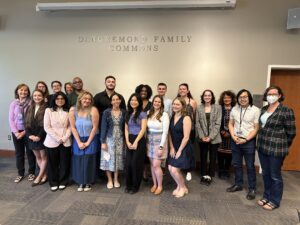
Thesis Students and Advisors 2024
Below is a list of each faculty member’s research areas, followed by titles of research projects. Most are senior theses, but some of the work done under other auspices is listed if it shows the breadth of possibilities better. The purpose of this list is to help students, who want to do research, learn the range of topics appropriate to each faculty member.
Dina Anselmi (Cognitive, social, and gender development; children’s rights)
Titles of Senior Theses supervised by Prof. Anselmi
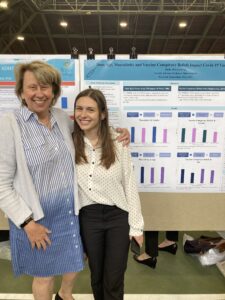
Menounos, M. (2023). Does age, masculinity and vaccine conspiracy beliefs impact Covid-19 vaccination status?
Furlan, V. (2023). Do empathy, prosociality, and cultural orientation predict age and gender trends for Covid-19 vaccination status?
Kiely, E. (2022). The relationship between attachment style, personality, and intercultural effectiveness with intent to study abroad.
Parker, D. (2022). How do arts programs facilitate emotion regulation in the prison setting?
Gasataya, S. (2021). Understanding COVID-19Related Behaviors Through Culture.
Alexandre, I. (2020). Differences in Maternal Care of Women under Medicaid vs. Private Insurance in Connecticut.
Armistead, C. (2018). Infant Mortality and Maternal Health in Hartford, CT.
Howell, C. (2018). Performance on the Affective Oddball Silhouette Task in Preschool-Aged Children Exposed to Intimate Partner Violence.
Vargas, J. (2018). Exploring Gender Identity in Cisgender Individuals.
Sager, J. (2015). The relationship between academic and psychological help seeking and attachment styles.
Balsmeyer, L. (2014). Second and fifth grade children’s attitudes towards autism spectrum disorder (ASD).
Scelsa, V. (2014). Effect of gender and type of gaming on aggressive and prosocial behavior.
Sims, B. (2009). Effect of maturity level on family decision making processes and beliefs about children’s rights.
Freedman, R., & Hills, M. (2009). Metrosexuality in relationship to hegemonic masculinity and materialism.
Jones, C. (2008). College students’ views on children’s rights and family decision-making in relation to adolescent psychological maturity.
King, L, Williams, A., & Zanno, M. (2008). The effects of cognitive and social interventions on preschool children’s gender stereotyping.
Titles of Senior Theses Supervised by Prof. Anselmi and Prof. Lee
Meckler, S. (2008). Text messaging: Examining the significance of romantic relationships.
Dance, K. (2006). Sensory integration dysfunction in children with and without autism.
Titles of Senior Theses Supervised by Prof. Anselmi and Prof. Reuman
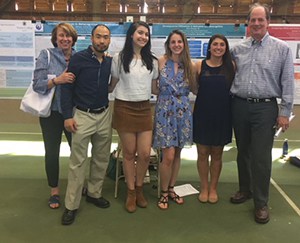 Brown, C. (2021). Do Peer Relations and Perceptions of Risk Impact Student Adherence in Response to the Trinity College COVID-19 Pandemic Restrictions?
Brown, C. (2021). Do Peer Relations and Perceptions of Risk Impact Student Adherence in Response to the Trinity College COVID-19 Pandemic Restrictions?
Chen, I. (2019). Relations Among Cultural Metacognition, Fusion Teamwork, and Team Creativity.
Curreri, O. (2019). Foreign Language Learners’ Use of Metacognitive Strategies in Reading Comprehension Tasks: Effects of Spanish Proficiency and Task Language.
Jenkins, A. (2018). Gender Differences in Metacognition and Motivation.
Katsumata, D. (2018). What Do You Mean I Got a D+? Effects of Feedback Type and Quality on Metacognition, Motivation, and Academic Performance in High School Students.
Ramsay, J. (2018). Developmental Differences in Metacognition and Motivation.
Treglia, M. (2018). Alternative Ways to Measure Metacognition: Offline Versus Online Assessment.
Elinoff, K. (2017). Learn 2 Learn: Enriching Student Success Through Metacognitive School-Based Intervention: A Longitudinal Follow Up of Middle School Students in High School.
Lee, J. (2017) Learn 2 Learn: Metacognitive School-Based Interventions for Typically Developing Students and Students with Special Needs.
Regalado, A. (2017). The Oregon Trail: A Think-Aloud Assessment of Metacognition in 8th Grade Students.
Scollard, E. (2017). Learn 2 Learn: Developmental Differences in Motivation and Metacognition.
Gonzalez, B. and Thomann, L. (2016). Learn 2 Learn: A metacognitive intervention for 6th and 8th grade students.
Caporale, E. (2016). Enriching student success through metacognitive school-based intervention: Following students from middle school into high school.
Schnackner, J. and Fulton, M. (2015). Enhancing metacognition and mindfulness in middle school students: Can simultaneous interventions improve academic performance?
Godfrey, T. and Lopez, M. (2014). Learn 2 learn: a metacognitive intervention.
Howe, E. (2013) Self-regulated learning and academic achievement in middle school students. (Non-Trinity sponsor: Debra Avery, Hartford Magnet Trinity College Academy).
Naratil, T. (2013). The MC5: Creating a new adolescent measure of metacognition.
Titles of Senior Theses Supervised by Prof. Anselmi and Prof. Chin. 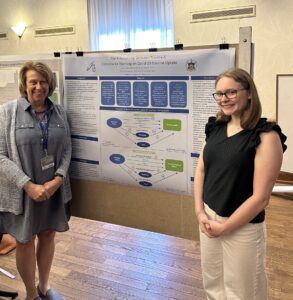
Bessette, L. (2024) The relationship between trauma and conspiracist thinking on covid-19 vaccine uptake.
Nugent, G. (2024) The relationship between social media and conspiracist thinking on covid-19.
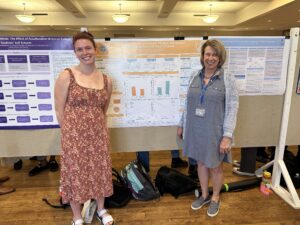 Titles of Senior Theses Supervised by Prof. Anselmi and Prof. Holt.
Titles of Senior Theses Supervised by Prof. Anselmi and Prof. Holt.
Lee, J. (2017). Using Literacy to Shift Attitudes and Behaviors for Children with Incarcerated Parents.
Titles of Senior Theses Supervised by Prof. Anselmi and Prof. Helt.
Machinski, M. (2021). Examining the Impact of Familial Characteristics on Anxiety in High-Risk Children.
Susan Averna (Wellness interventions for college students, attachment-based interventions in education, impact of trauma on learning and behavior.
Titles of Senior Theses Supervised by Prof. Averna.
Gilbertson, M. (2021). The Role of Peer Mentors in Patients’ Sense of Hope and Recovery.
Elizabeth Casserly (Language use, speech perception, speech poduction in different environments, bilingualism, issues of attention and memory)
Titles of Senior Theses supervised by Prof. Casserly
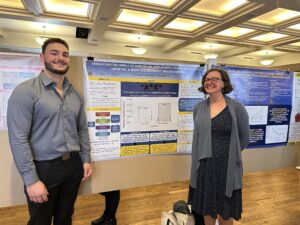
Cangiano, S. (2024). Unraveling the impact of mirrors on body anxiety, efficacy, and workout expertise: A novel eye movement analysis approach.
Emerson, B. (2024). The impact that a component of visual self feedback that is relevant to dramatic or sensory play has on mirror engagement and language skills in preschoolers. 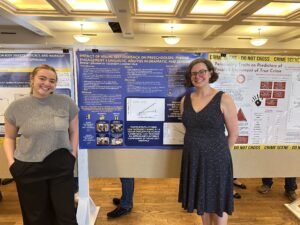
Sushon, Alexander. (2022). The effect of real-time visual feedback on visual intelligibility.
Reifler, A. (2021). Puzzle Solving Strategies: How College Students Strategize and Solve Arrangement Problems.
Spencer-Orrell, M. (2020). Mirror Presence and Cognitive Functioning: Working Memory and Eye-Tracking.
Lee, N. (2020). The Interference and Intelligibility of Speech Articulation.
Douglas, E. (2018). Linguistic Behaviors in Television Interviews.
Kuzmickaite, B. (2018). Mirror, Mirror On the Wall: Influences on Short-Term Verbal Memory.
Santora, M. (2018). How the Birth Control Pill Influences Women’s Attitudes and Expectations of Themselves.
Thulin, J. (2018). Sensorimotor Speech Control and the Intelligibility of Speech.
Ballenger, T. (2017). Effects of Visual Self-Image on Attention During Speech.
Pollack, E. (2017). Cooperation Via Communication: Influencing Vocal Alignment in Conversation.
Drews, H. (2016). The effect of participant engagement on cochlear implant speech perception.
Krizmanich, T. (2016). The effect of simultaneous incorporation of multiple talkers and semantic cohesion on cochlear implant speech comprehension.
Titles of Senior Thesis Supervised by Profs. Casserly and Reuman
Singer, B. (2015). Extended stereotype threat: parental concern that a child will confirm a negative stereotype associated with dyslexia.
Brian Chin (social relationships (e.g., attachment theory, social support, social networks, social interactions, social behaviors, loneliness); behavioral medicine (e.g., sleep/circadian rhythms, exercise, eating, stress); social determinants of health (e.g., race, socioeconomic status)
Titles of Senior Theses supervised by Prof. Chin
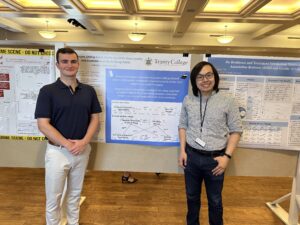 Kinsella, J. (2024). Mechanisms linking social media use with sleep quality and insomnia severity in young adults.
Kinsella, J. (2024). Mechanisms linking social media use with sleep quality and insomnia severity in young adults.
Raupe, C. (2024). Medical trauma in pediatric and adult patients with crohn’s and ulcerative colitis. 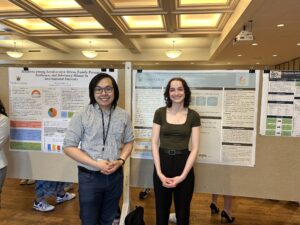
Titles of Senior Theses supervised by Prof. Chin and Prof Casserly
Marcial-Modesto, D. (2023). Pet ownership and mental health in United States adults during Covid-19 pandemic.
Kelly Ferreira (How different styles of regulating emotion can affect cognitive abilities and skills)
Titles of Senior Theses supervised by Prof. Ferreira
Morgan, J. (2023).Evaluating law enforcement tactics used to de-escalate individuals with psychotic symptomology.
Jason Gockel
Titles of Senior Thesis Supervised by Prof. Jason Gockel
Scott, B. (2017). Aggression and Depression Factors in Pornography Use of College Aged Individuals.
Michael Grubb (Visual perception and the factors that modulate it (e.g., selective attention, temporal and spatial context); speed-accuracy trade-offs in perception and cognition; the interaction of attention)
Titles of Senior Theses supervised by Prof. Grubb
Massa, N. (2023). Manipulating uncertainty in value-driven attention capture. Collaborators: Nick Crotty, ’24 and Ifat Levy, Ph.D Wang, K. (2021). Investigate the Correlation Between State Boredom and Attentional Blink Degree.
Miller, J. (2021). Investigating the Relationship between State Boredom and Response Criterion.
Francis, J. (2021). Investigating the Change in State Boredom After Completion of the Attentional Blink Paradigm.
Butler, D. (2019). Meaning-Imbued Onsets Yields Increased Efficiency in Performance-Contingent Reward Task, but Only Later in Time.
Gannon, E. (2019). How Filmmakers Hijack Our Eyes: The Effect of Average Shot Length (ASL) on Attentional Synchrony.
Li, Y. (2017). Speed-Accuracy Trade-Off in Value-Driven Attention Capture.
Molly Helt (Autism and interventions to lessen its effects)
Titles of Senior Theses supervised by Prof. Helt
Freda, C. (2023). Self-esteem and resilience in College students with ADHD: Does social support play a critical role? Jensen, L. (2023). Do ADAH symptoms differ between sexes in college students diagnosed with ADHD? Greenbaum, J. (2021). What are the Social Implications of Dyslexia?
Phuong, N. (2019). Parenting Style and Child Temperament Are Associated with Distinct Types of Child Behavior Problems.
Vimini, S. (2019). The Relationship Between Parenting Styles and Child Anxiety with Age and Gender as Moderating Variables.
Rock, D. (2016). Parent report on the impact a service dog has on children with autism spectrum disorder.
Wadhwa, N. (2015). Are the self-stimulatory behaviors that children with autism engage in addictive?
Alisha Holland (Autobiographical memory and emotion: how we regulate our emotions about past events)
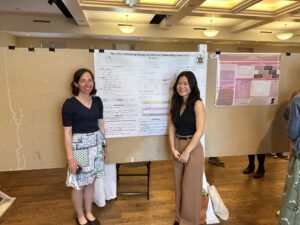 Hu, C (2024). The effect of drawing versus clay work on emotion regulation in college students.
Hu, C (2024). The effect of drawing versus clay work on emotion regulation in college students.
Michelson, H. (2022). Narrative coherence and well-being during life transitions.
Blumenschein, B. (2021). Impact of Transportability Into Literacy Fiction on Levels of Empathy Towards Outgroups.
Lu, A. (2021). Autobiographical Memory and Body Image in Female Athletes.
Laura Holt (Clinical, community, addiction; evaluation of community and school-based interventions; personal, social, and academic adjustment to college)
Titles of Senior Theses supervised by Prof. Holt
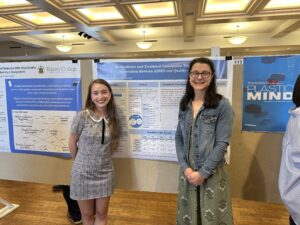
Macht, A. (2024). Does resilience moderate the association between ADHD, quality of life, and treatment satisfaction. 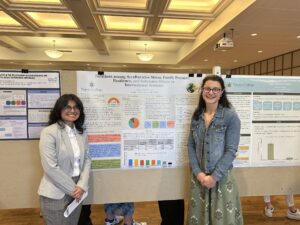 Paredes, A. (2024). Relations among acculturative stress, family pressure, resilience, and substance misuse in international students.
Paredes, A. (2024). Relations among acculturative stress, family pressure, resilience, and substance misuse in international students.
Futter, A. (2023). Testing the feasibility of a positive psychology mobile health app for college electronic cigarette users? Non-Trinity sponsor: Bettina Hoeppner, Ph.D.
Latimer, L. (2023). E-cigarette expectancies, consequences, and preferred quit strategies: Implications for interventions with college students.
DeLucia, A. (2022). Predictors of medical misuse and diversion among college students prescribed stimulant medications.
Shapiro, M. (2022). Changes in college students’ substance use habits and motivations during covid-19. Verdier, A. (2022). Predictors of prescription stimulant medical misuse and diversion: conduct problems and perceptions of risk.
Wint, A. (2021). Nicotine and Cannabis Vaping Among College Students: Factors Associated with Initiation, Patterns of Use, and Dependency.
Zeien, N. (2021). Substance Use Trajectories Among College Graduates: Associations with Negative Mood States, Employment, and Quarantine.
Pingeon, C. (2020). How Do Personality and the Media Shape Perceived Risks and Benefits of E-cigarettes?
Najarian, C. (2020). Social Influences on Emerging Adults’ Vaping.
Chambers, J. (2019). Racial/Ethnic Identity Expression at Trinity College: P.R.I.D.E as a Psychological Buffer.
McCarthy, M. (2019). Predictors of Prescription Stimulant Misuse in College Graduates.
Marsh, E. (2018). Efficacy of Different Refusal Strategies for Non-Medical Prescription Stimulant Requests.
O’Connor, K. (2018). The Influence of Protective Behavioral Strategies and Coach Management Strategies on Student-Athletes’ Alcohol Use: A Mixed Methods Study.
Stanley, A. Alcohol Use in Student Athletes: The Influence of Injunctive Norms, Trait Urgency and Competitiveness.
Marut, P. (2017). Pursued for Their Prescription: College Students with ADHD who are Approached for Their Stimulant Medication.
Brattan, L. (2016). Factors that promote engagement in a youth violence prevention program.
Engle, D. (2015). Preventing and reducing non-medical prescription stimulant use: A group motivational enhancement intervention.
Long, M. (2015). A longitudinal examination of parental and peer attachment and its association with college adjustment and risky behavior during the college years.
Rorer, K. (2015). The effect of relationship education on college students’ negative affect, relationship beliefs, and risky sexual behavior.
Eff, H. (2014). The content and malleability of college students’ perception of non-prescription stimulant use.
Minot, C. (2014). Psychological and demographic predictors of non-prescription stimulant expectancies and misuse in college students.
Reingold, R. (2014). An exploratory study of college students’ attitudes about ecstasy.
Young, M. (2014). College students’ perceived risks of ecstasy use and the state of ecstasy prevention.
Titles of Senior Theses Supervised by Profs. Holt and Casserly
Zhu, T. (2021). Depression and Information Processing: The Influence of Affective Cues on College Students’ Memory Retrieval.
Titles of Senior Theses Supervised by Profs. Holt and Helt
Chalfin, A. (2017). The Role of Family Dynamics in a Prevention Intervention Study for Childhood Anxiety.
Titles of Senior Theses Supervised by Prof. Holt and Carol Shilliday
Callahan, J. (2011).Relationships among Parent and Peer Attachment, Emotion Regulation, Self Esteem, and Risky Behavior in First-Year College Students
Titles of Senior Theses Supervised by Profs. Holt, Anselmi, and Reuman
Gascoigne, B. (2010). The effect of student perceptions of teacher feedback on motivational variables for learning.
Klotz, E. (2010). Motivated to achieve: Improving academic achievement by enhancing students’ self-efficacy beliefs.
Nyce, L. (2010). Perceived modifiability of quantitative reasoning and self-efficacy in college students.
Titles of Senior Theses Supervised by Prof. Holt and Prof. Lee
Washington, J. (2013). Relations among psychological and demographic factors in individuals with lower limb amputation.
Titles of Senior Theses Supervised by Prof. Holt and Prof. Anselmi
Benson, M. (2013). Effects of perceived opportunity and ego depletion on collegiate academic misconduct.
Fernandez, G. (2012). Dysfunctional beliefs, ADHD symptoms, and early developmental influences as predictors of symptom severity in compulsive hoarding and obsessive compulsive disorder.
Ley, J. (2012). The effects of a school-based arts program on youths’ social, personal, and academic functioning.
Randolph Lee (Clinical, stress reduction and athletic performance, Transcendental Meditation; eating disorders)
Titles of Senior Theses supervised by Prof. Lee
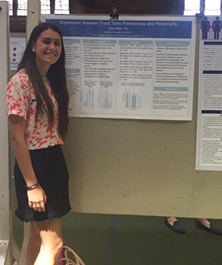
Casey, T. (2023). The influence of digital media consumption on disordered eating and body image.
Patel, A. (2023). The international student social experience at a predominately white institution.
Densen, E. (2022). Covid-19 and anxiety and depression prevalence in college counseling centers.
Rutt, S. (2021). The Relationship between Body Image Expectations and Exercise, eating, and Social Behavior.
Gillen, C. (2021). The Effect of Dance Movement on Stress and Mood.
Abrahim, P. (2020). Mantra in Meditation: the Effect of Sound on Relaxation.
Ragland, J. (2020). The Actual versus the Perceived Substance Use of College Students.
Aliev, A. (2018). An Exploration of the Link Between Food Taste Preferences and Personality.
Carlisle, P. (2017). The Effects of Mindfulness on Several Dimensions of Athletic Performance.
Lukac, N. (2015). Participation in a group of formerly incarcerated women on students’ self-disclosure, self-esteem, empathy, and anxiety. Supervised also by Prof. Judy Dworin.
Blau, L. (2014). The effects of exercise on state and trait anxiety.
Durkin, K. (2014). Autonomous sensory meridian response: the role of ASMR as a therapeutic relaxation technique.
Buraityte, A. (2013). Comparative effects of mindfulness meditation and transcendental meditation among college students: perceived stress, mindfulness, and satisfaction with life.
Howard, L. (2012). A comparison of stress levels in college athletes: Division I vs. division III.
Pariseau, E. (2012). Assumptions and “facts” about college self-regulated sexual behavior.
Poon, A. (2012). Computer game addiction and emotional dependence.
Titles of Senior Theses supervised by Profs. Lee and Raskin
Desrosier, N. (2017). The Relationship Between Mindfulness Meditation, Stress, and Empathy.
Susan Masino (Neuroscience, role and regulation of adenosine in the brain – including caffeine effects, epilepsy and other clinical conditions)
Titles of Senior Theses supervised by Prof. Masino
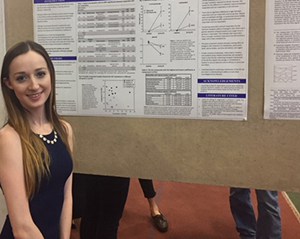
Freedgood, N. (2018). The Ketogenic Diet Shifts Cerebrospinal Fluid Metabolome and has Differential
Effects in Responsive vs. Non-Responsive Pediatric Epilepsy Patients.
Suter, T. (2011) Pain reduction via the ketogenic diet: involvement of adenosine A1 receptors.
Svedova, J. (2011) Effects of the ketogenic diet on behavior and symptoms of autism: human and animal studies.
Chandra, R. (2010) Neural network abnormalities in AD/HD: A study using dynamic causal modeling.
Ruiz, T. (2010) Effects of the ketogenic diet on behavior and physiology of R6/2 Huntington’s disease transgenic mice.
Plotkin, L. (2009) The effect of situations predicted to influence adenosine on the stereotypical behaviors associated with autism.
Pomeroy, L. (2009) How does the ketogenic diet stop seizures?: A genetic and pharmacological exploration.
Wasser, C. (2008) Exploring the relationship between the ketogenic diet and endogenous adenosine levels in the brain.
Titles of Senior Theses Supervised by Prof. Masino and Prof. Blaise
Koranda, J. (2005) Adenosine modulation of synaptic plasticity in a freely moving mouse model lacking adenosine A1 receptors.
Phouyaphone, N. (2006) Bi-directional synaptic plasticity in freely behaving adenosine A1 receptor-deficient mice.
Chow, U. (2009) The effects of the ketogenic diet on synaptic plasticity in freely behaving adult rats.
Robert Outten (Intergroup relations, coping with discrimination, collective identity, social inequality, health and well-being, cross-cultural psychology)
Titles of Senior Theses supervised by Prof. Outten
Dyer, N. (2024). Examining psychological correlates to black americans’ willingness to seek mental health treatment. 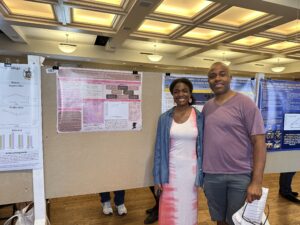
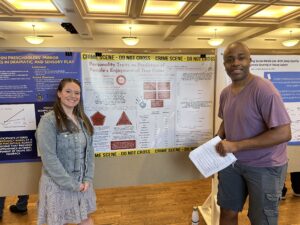 Johnson, A. (2024). Personality traits as predictors of people’s enjoyment of true crime.
Johnson, A. (2024). Personality traits as predictors of people’s enjoyment of true crime.
Dimova, C. (2023). Generational status and acculturation as determinants of Bulgarian Americans’ life satisfaction and perceptions of self.
Birk, G. (2021). Political Ideology and Personality as Predictors for COVID-19 Attitudes and Behaviors.
Ren, E. (2021). American Identity and the Symbolic Threat of COVID-19 as Determinants of Attitudes Toward the U.S., China, and Chinese People.
Ferguson, Z. (2018). Americans’ Attributions About a Mass Shooting and its Perpetrator: The Role of the Perpetrator’s Cultural Background.
Lee, T. (2018). Why Can’t You Guys be More Like Them? Model Minority Myth Salience Heightens White Americans’ Negative Perceptions of Black Americans and Reduces Support for Affirmative Action.
Muse, S. (2018). Do Trinity Students Involved in Greek Life Appraise Themselves, Others, Trinity College, and Society Differently than Non-Greeks Do?
Dorsey, P. (2017). The Effect of a Single Mothers’ Marital Status on Sympathy, Character Evaluations and Maternity Leave Support.
Lawrence, M. (2017). The Interplay Between Gender Ideology, Gender Identity and Distinctiveness Threat in Cisgender Women’s Emotional Responses Toward Trans Women’s Acceptance into Women’s Colleges.
Sarah Raskin (Neuroscience, cognitive effects of brain injury, rehabilitation after brain injury, prospective memory)
Titles of Senior Theses supervised by Prof. Raskin
Zhang, I. (2022). Online therapy’s influence on college student’s emotional health. Caceres, C. (2021). Traumatic brain injury consumers’ experience and satisfaction with telehealth during COVID-19 pandemic. Rangray, A. (2021). The effect of drinking behaviors on prospective memory among college students.
Stein, M. (2016). Prospective memory and judgments of learning: Measuring the effects of traumatic and mild traumatic brain injury.
Cazalet, A. (2014). Differences in empathy between high and low schizotypal college students.
McCauley, S. (2013). Differences in empathy between high and low schizotypal college students.
Zamroziewicz, M. (2013). Effects of drinking patterns on prospective memory performance in college students.
Mills, G. (2012). Prospective memory in children with epilepsy using memory for intentions screening for youth.
Agolli, E. (2011). Predictors of cognitive rehabilitation success on a simultaneous multiple attention task in people with schizophrenia.
Alderman, M. (2011). The impact of the age at surgery and type of surgical intervention on long-term neuropsychological outcomes in sagittal craniosynostosis.
Foster, K. (2011). Altered default mode network connectivity is correlated with impulsivity and binge drinking in college students.
Garbarino, J. (2011). A study of pro-social prospective memory in children.
Lewis, A. (2011). The effects of exercise on the success of cognitive rehabilitation in schizophrenia. (Non-Trinity college sponsors: Matthew M. Kurtz and Mara De Maio, Hartford Hospital, Institute of Living.
Novak, L. (2011). Brain and alcohol research in college students: collegiate academic performance in relation to alcohol consumption and cognitive ability.
Amie Senland (Moral reasoning, empathy, and individuals with autism spectrum disorder, faith development)
Titles of Senior Theses supervised by Prof. Senland
Kellar, A. (2023). The impact of empathy and moral disengagement on affective polarization.
Independent study projects on other topics have included
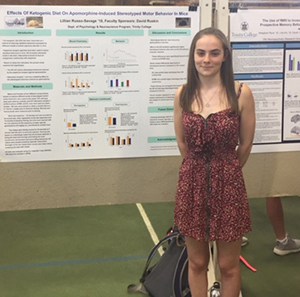
Russo-Savage, L. (2018). The Effects of Ketogenic Diet on Apomorphine-Induced Repetitive Motor Behavior in Mice.
Sital, M. (2014). Cultural variations in distress tolerance: influence on seeking social support.
Arencibia, J. (2013). Cultural influences on the life satisfaction of white Americans and Latinos.
Piotrowski, K. (2013). Cultural norms regarding emotional expression: influences on the provision and receipt of social support.
Moore, M. (2012). The role of emotion regulation in the practice of familial coping among Latinos and Asian Americans.
Zhang, H. (2012). The effect of primary and secondary control on social anxiety in Latino and Asian American college students.
Vince, J. (2009). The relationship between Asian and Latino cultural values, primary and secondary control, and emotion regulation.
Paneva, R. (2009). How familism and fatalism relate to primary and secondary control coping in Latino and Asian American college students.
Matt, A. (2009). Differences in amount and perceived helpfulness of self-disclosure in Asian Americans and Latinos.
Hughes, D. (2009). The effects of data representation on how individuals perceive results.
